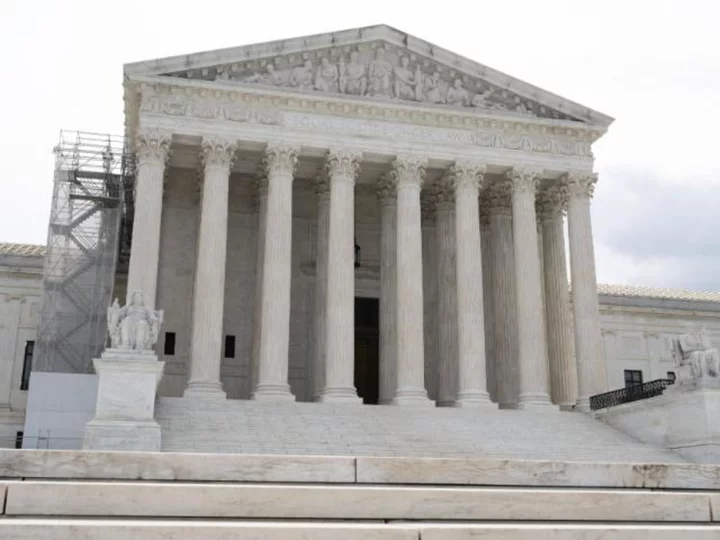By Brendan O'Brien
CHICAGO (Reuters) -An intensifying heat wave descended on the eastern United States on Thursday, prompting warnings about the dangers presented by the sweltering heat and humidity in the final days of a record-smashing July around the world.
Some 180 million Americans - about half the population of the United States - are under heat watches and warnings, with temperatures and heat index values well above 100 degrees Fahrenheit (37.8 Celsius) in the forecast until at least Saturday, the National Weather Service said.
As temperatures soared midday on Thursday, President Joe Biden met with Phoenix, Arizona, Mayor Kate Gallego and San Antonio, Texas, Mayor Ron Nirenberg to discuss the impact the hot summer has had on their southern cities.
"I don't think anybody can deny the impact of climate change anymore," he said during his remarks.
"Even those who deny that we're in the midst of a climate crisis can't deny the impact extreme heat is having on Americans," he later added, imploring the vulnerable to stay indoors.
Officials in New York City, Washington D.C., Philadelphia and other big cities urged people to avoid working or playing outside, to drink plenty of fluids and to check on loved ones and neighbors.
"The next four days will be extremely hot - take care of yourself and the people around you," Washington Mayor Muriel Bowser said on X social media platform, formerly known as Twitter. The nation's capital is expected to see the heat index, a measure of what the temperature feels like to the human body, reach 107 degrees F (41.7 C).
In Philadelphia, officials declared a health heat emergency until Saturday and created a phone help line for the elderly, opened cooling centers and increased homeless outreach.
Cooling centers have also been opened across New York City for those who do not have access to air conditioning. The heat index could reach 103 degrees F (39.4 C) on Friday in the most populous U.S. city.
"Heat is deadly, and climate change is making extreme heat more frequent and even more dangerous, especially for vulnerable New Yorkers," New York City Health Commissioner Ashwin Vasan said in a statement.
Lourdes Rosario, an employee at Daniela's Flower Shop II in New York's Harlem neighborhood, said the heat wave was too much for more delicate blooms.
The florists put their plants out front to draw in customers, but right now only the potted plants like cacti and tall, leafy, snake plants can stand the heat.
"Some flowers are all-year flowers, those are fine," Rosario said. But the fresh-cut flowers can no longer go out front, she said: "It's way too hot."
HUMAN-DRIVEN CLIMATE CHANGE
The growing frequency and intensity of severe weather is symptomatic of global, human-driven climate change that is fueling extremes, experts in the field say, with heat waves in much of the world expected to persist through August.
June 2023 was the hottest on record in the United States, dating back to 1850. It also was the 47th consecutive June and the 532nd consecutive month with temperatures above the 20th-century average, according to the weather service.
Biden said he has asked acting Labor Secretary Julie Su to issue a heat hazard alert, clarifying federal heat-related protections for workers.
"The construction workers who literally risked their lives working all day in blazing heat, and in some places don't even have a right to take a water break, that's outrageous," Biden said.
Extreme heat is the top cause of weather-related deaths in the United States, according to the Bureau of Labor Statistics, which shows that 436 workers have died due to hot conditions since 2011.
Biden also said the federal government was taking several other steps to address the weather crisis, including the U.S. Forest Service awarding more than $1 billion in grants to help municipalities plant trees.
This month is shaping up to be a record-breaker on a global basis. Thousands of tourists fled wildfires amid baking temperatures in Greece, while temperatures in a northwest China township soared as high as 52.2C (126F).
An analysis by Germany's Leipzig University released on Thursday found that July 2023 will shatter heat records, with the mean global temperature projected to be roughly 1.5 degrees Celsius (2.7 Fahrenheit) above the pre-industrial mean.
A prolonged heat wave has been parked over the U.S. Southwest for weeks. Phoenix is expected to see its 28th consecutive day of temperatures above 110 degrees F (43.3 C) on Thursday, shattering the previous record of 18 straight days.
(Reporting by Brendan O'Brien in Chicago; Editing by Rosalba O'Brien)









